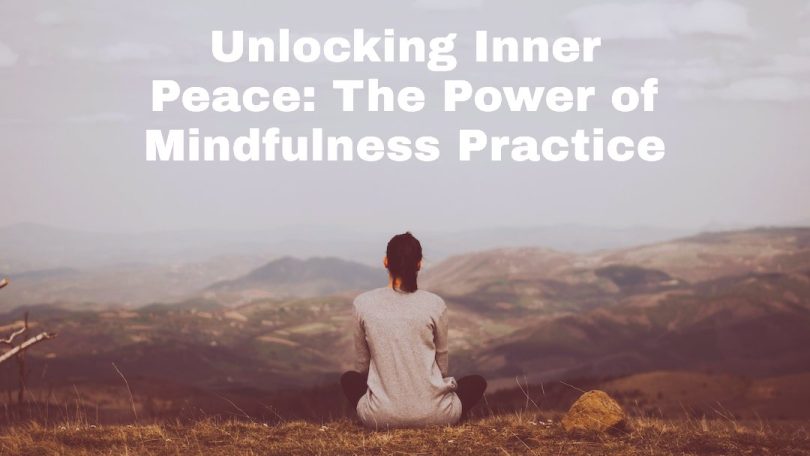Mindfulness practice has gained significant popularity in recent years, as people seek ways to find inner peace and improve their overall well-being. Mindfulness is the practice of intentionally bringing one’s attention to the present moment, without judgment. It involves paying attention to thoughts, feelings, and sensations in a non-reactive way. The benefits of mindfulness practice are numerous, ranging from reduced stress and anxiety to improved sleep and emotional well-being.
This post contains Amazon affiliate links, meaning I may earn a small commission if you purchase through my links, at no extra cost to you. Note: We aim to provide accurate product links, but some may occasionally expire or become unavailable. If this happens, please search directly on Amazon for the product or a suitable alternative.
Key Takeaways
- Mindfulness practice is important for achieving inner peace.
- Mindfulness involves understanding the mind-body connection.
- Mindfulness can help reduce stress and anxiety.
- Breathwork plays a crucial role in mindfulness practice.
- Mindfulness cultivates self-awareness and emotional intelligence.
The Importance of Mindfulness Practice for Inner Peace
Inner peace can be defined as a state of tranquility and harmony within oneself. It is a sense of calmness and contentment that comes from being fully present in the moment and accepting things as they are. Mindfulness practice is a powerful tool for achieving inner peace because it helps individuals cultivate a non-judgmental awareness of their thoughts, emotions, and sensations. By observing these experiences without getting caught up in them or trying to change them, individuals can develop a sense of detachment and equanimity that leads to inner peace.
Understanding the Mind-Body Connection in Mindfulness
The mind-body connection refers to the relationship between our thoughts, emotions, and physical sensations. It is the understanding that our mental state can influence our physical well-being, and vice versa. Mindfulness practice helps improve the mind-body connection by bringing awareness to the present moment and tuning into the sensations in our body. By paying attention to our physical sensations without judgment or resistance, we can become more attuned to our body’s needs and respond to them in a compassionate way.
How Mindfulness Can Help Reduce Stress and Anxiety
Stress and anxiety are common experiences in today’s fast-paced world. Stress is the body’s response to a perceived threat or challenge, while anxiety is a general feeling of unease or worry. Mindfulness practice can reduce stress and anxiety by helping individuals become more aware of their thoughts and emotions, and by teaching them to respond to stressors in a more mindful and compassionate way. By practicing mindfulness, individuals can develop a greater sense of calmness and resilience in the face of stress and anxiety.
The Role of Breathwork in Mindfulness Practice
Breathwork is a key component of mindfulness practice. It involves paying attention to the breath as it enters and leaves the body, without trying to control or change it. Breathwork can enhance mindfulness practice by serving as an anchor for attention. By focusing on the breath, individuals can bring their attention back to the present moment whenever they find themselves getting caught up in thoughts or emotions. Breathwork also has a calming effect on the nervous system, helping to reduce stress and promote relaxation.
Cultivating Self-Awareness through Mindfulness

Self-awareness is the ability to recognize and understand one’s own thoughts, emotions, and behaviors. It is an essential skill for personal growth and development. Mindfulness practice can cultivate self-awareness by helping individuals become more attuned to their inner experiences. By observing their thoughts, emotions, and sensations without judgment, individuals can gain insight into their patterns of thinking and behaving. This increased self-awareness allows individuals to make conscious choices that align with their values and goals.
Mindfulness and Emotional Intelligence: A Powerful Combination
Emotional intelligence refers to the ability to recognize, understand, and manage one’s own emotions, as well as the emotions of others. It is a key factor in building strong relationships and achieving success in various areas of life. Mindfulness practice can improve emotional intelligence by helping individuals become more aware of their emotions and develop greater emotional regulation skills. By observing their emotions without judgment or reactivity, individuals can respond to them in a more skillful and compassionate way.
The Science behind Mindfulness: How It Affects the Brain
The science behind mindfulness is a rapidly growing field of research. Studies have shown that mindfulness practice can have a profound impact on the brain. Regular mindfulness practice has been found to increase the size of the prefrontal cortex, which is responsible for executive functions such as attention, decision-making, and emotional regulation. It also reduces the size of the amygdala, which is involved in the stress response. These changes in brain structure and function contribute to the numerous benefits of mindfulness practice.
Mindfulness for Better Sleep and Improved Well-Being
Sleep is essential for overall well-being, yet many people struggle with sleep disturbances and insomnia. Mindfulness practice can improve sleep by promoting relaxation and reducing stress and anxiety. By practicing mindfulness before bedtime, individuals can create a calm and peaceful state of mind that is conducive to sleep. Tips for incorporating mindfulness into a bedtime routine include practicing breathwork, engaging in a body scan meditation, and avoiding stimulating activities before bed.
Mindfulness and Relationships: Building Stronger Connections
Mindfulness practice can also improve relationships by helping individuals become more present and attentive in their interactions with others. By practicing mindfulness with others, individuals can cultivate empathy, compassion, and understanding. Tips for practicing mindfulness with others include active listening, non-judgmental observation of emotions, and mindful communication. By bringing mindfulness into their relationships, individuals can build stronger connections and foster greater intimacy.
Overcoming Obstacles to Mindfulness Practice: Tips and Strategies
While mindfulness practice offers numerous benefits, it is not always easy to maintain a consistent practice. Common obstacles to mindfulness practice include lack of time, distractions, and resistance to sitting still. However, there are strategies that can help individuals overcome these obstacles. Tips for maintaining a consistent mindfulness practice include setting aside dedicated time each day, creating a designated space for practice, and starting with short periods of practice and gradually increasing the duration.
In conclusion, mindfulness practice is a powerful tool for achieving inner peace and improving overall well-being. By cultivating a non-judgmental awareness of the present moment, individuals can reduce stress and anxiety, improve sleep, enhance self-awareness, and build stronger relationships. The science behind mindfulness shows that it has a profound impact on the brain, leading to structural and functional changes that support these benefits. By incorporating mindfulness into daily life, individuals can experience greater peace, happiness, and fulfillment.









